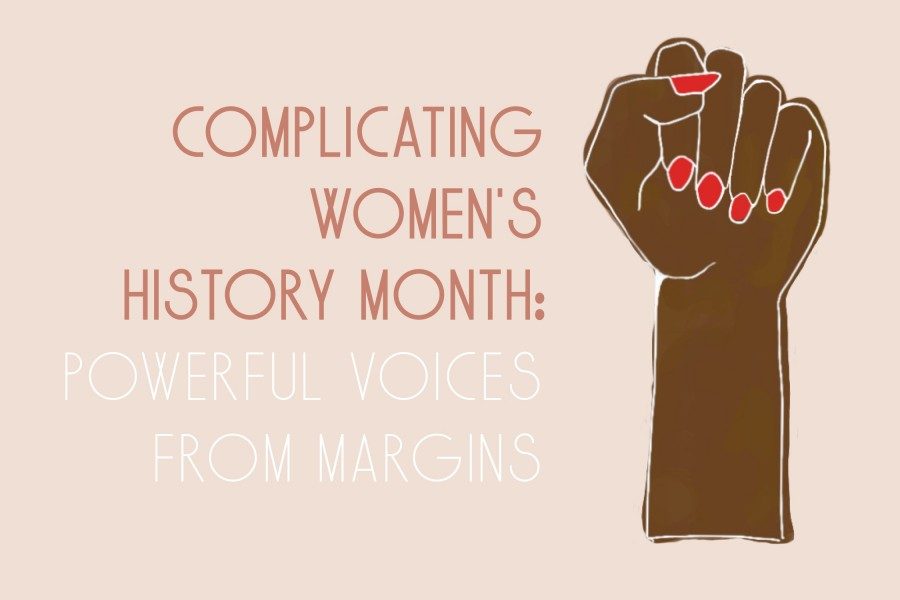Complicating Women’s History Month: powerful voices from margins
As the nation celebrates Women’s History Month this March, citizens reflect on the significance and impact of what it means to be a woman. As the years go by, women are rightfully attaining more opportunities to voice their struggles and surpass social obstacles one barrier after another.
Reflecting on the different experiences of different women and femme people, however, must include an intersectional lens. All women face a difficult path, but some more than others. Seventy two percent of hate crimes against the LGBTQ community and people with HIV were directed towards transgender women, and two-thirds of the hate crimes were against transgender women of color.
In addition, white women have a median weekly earning from a full-time job of $800, compared to the median of almost $1000 for white men. For Black and Latinx women, however, that median is $657 and $603, respectively.
Here in New Orleans, Vita McClebb, a transgender black woman, continues to be missing since this past November. Based on these facts, from pay discrepancies to facing violence, femmes of color and transgender femme folks continue to be marginalized more severely than their straight, cis, white peers.
For this issue, Intersections wants to recognize the contributions of several femmes and women throughout U.S. history and their legacies towards an equitable, intersectional society. The reason Intersections includes non-binary femme people in the following list is because we want to acknowledge the far reach and impact of patriarchy on femme people who lie beyond the gender binary.
Johnson was a transgender black woman best known for instigating and helping lead the Stonewall uprising in New York City in 1969. Johnson was an activist and advocate for the LGBTQ community, and for trans people in particular. She, along with Sylvia Rivera, founded the Street Transgender Action Revolutionaries (STAR) to support homeless transgender youth in New York City. Johnson was also an acclaimed “drag mother” because she toured around the world and helped homeless transgender and LGBTQ children whenever she could. Johnson was also a model for an Andy Warhol photography collection during the 1970s.
Rivera was a transgender Latinx person from the Bronx. They collaborated with Marsha P. Johnson frequently, also helping lead the Stonewall uprising and co-founding STAR. Rivera was an active member of the Gay Liberation Front and the Gay Activists Alliance but left after realizing that the groups were not inclusive of more marginalized identities such as their own. In 1973, they gave a speech on this subject among a crowd of boos, calling out the leaders of the gay liberation movement, who were mostly white- and middle-class gay men. Prior to their speech, there were attempts by white lesbian leader Jean O’Leary to block them from speaking at all, going as far as physically assaulting Rivera. Rivera boldly challenged the whiteness and privileges that the audience members held, famously saying “Y’all better quiet down!”
Kochiyama was a Japanese-American activist from California. In 1943, after her father’s death, she was forced to relocate with her family to a Japanese internment camp in response to the bombing of Pearl Harbor. Kochiyama was a civil rights and anti-Vietnam War activist in Harlem in the 1960s, being a member of the Young Lords movement. She founded Asian Americans for Action in an effort for the Asian-American community to support the liberation of black Americans and all people of color. Kochiyama was a close friend of Malcolm X and collaborated with him, herself being an active member of his group, the Organization of Afro-American Unity. She also worked in the redress and reparations movement for Japanese-Americans.
Sarsour is a Palestinian-American Muslim activist from Brooklyn. She initially began her career in social justice by serving as the Executive Director of the Arab American Association of New York. She advocates for her local Muslim community, protesting the unwarranted surveillance and searches of Muslims in New York City. To this day, Sarsour continues to expand her activism work. Following the murder of Mike Brown, she co-founded the group Muslims for Ferguson to oppose police brutality.
Sarsour is also an active member of the Justice League NYC to support reformation of the U.S. criminal justice system. Sarsour most notably served as co-chair of the Women’s March in Washington, D.C. in 2017 and 2019. She stands in solidarity with Palestinians and their marginalization within the Israeli-Palestinian Conflict, speaking up and challenging the actions of the Israeli government.
Trask is an indigenous Hawaiian activist and scholar. Many of her works and actions are for the solidarity and rights of indigenous Hawaiians, and she stands up against the U.S. government for its neo-colonialist actions towards Hawaii. Task believes the U.S. and mainland Americans have no right to occupy the Hawaiian islands, as Hawaii’s monarchy was overthrown by the U.S. to further its imperialist goals and the islands hold a sacred meaning to Hawaii’s people and culture. Task currently serves as a professor for Hawaiian Studies at the University of Hawaii, in an effort to preserve and inform on the history, cultures and values of the Hawaiian islands.
Your donation will support the student journalists of Tulane University. Your contribution will allow us to purchase equipment and cover our annual website hosting costs.



